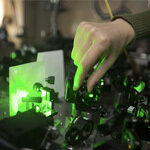
Browse Technologies
Keyword Search

Quantum Devices/Technology
Innovators are building the future of information processing and communication, with new photonic devices, materials, quantum memory systems, and algorithms.
Search Results
Displaying: 1 - 9 of 9 Results
Quantum Metrology based on Strongly Correlated Matter
Sensors using individual atomic defects in diamond have revolutionized local magnetic sensing. This technology is based on the insight that higher densities of defects can produce more sensitive detectors. However, at very high densities,…
Investigators
- Mikhail Lukin
- Norman Yao
- Soonwon Choi
Quantum memory using silicon-vacancy centers in diamond
In the field of diamond-defect-based quantum information processing, electron spins at defect sites sit within a diamond spin-vacuum and external interface is enabled via photon emission. In comparison to nitrogen-vacancy defects in diamond,…
Investigators
- Mikhail Lukin
- Denis Sukachev
- Christian Nguyen
- Mirir Bhaskar
- Alp Sipahigil
- Ruffin Evans
Quantum method for sampling spectral functions
Quantum computing is poised to transform modern technology by solving computational tasks that cannot be resolved by classical computing. Surprisingly, one of the central challenges for quantum technologies, is the search for useful applications of…
Investigators
- Eugene Demler
- Dries Sels
Integrated mounting solution for solid state spin sensors used for bulk detection and imaging
Sensors based on solid state spin system for measuring magnetic fields, electric fields, temperature, pressure, and other physical quantities can offer high resolution sensing at low cost and low power input. These systems employ point defects in…
Investigators
- Ronald Walsworth
- Matthew Turner
- John Barry
- Jennifer Schloss
Enhanced solid state spin magnetometer sensitivity using spin bath control and differential double quantum measurement
Nitrogen vacancy (NV) diamond solid-state spin systems are highly useful for quantum sensing, however, improving the sensitivity is essential to realizing their potential applications. DC magnetic field sensitivity is typically limited by dephasing…
Investigators
- Ronald Walsworth
- Connor Hart
- Erik Bauch
- Matthew Turner
- Jennifer Schloss
- John Barry
Novel Qubit Allocation Algorithm for Quantum Computers
Quantum computers will change the landscape of technology through their capability of solving complex problems that classical computers are unable to solve efficiently. Very soon, quantum computers with 50-100 qubits (intermediate-scale) will be…
DBD
- Sam Liss
Investigators
- Prineha Narang
- Wil Finigan
- Michael Cubeddu
- Yudong Cao
- Thomas Lively
Deterministic entangled photon pair sources for quantum computing
Quantum entanglement, the non-classical correlation between different subsystems, is a key advantage that quantum computing has over classical computational systems. In quantum communication, entangled photon pairs are a crucial component in…
DBD
- Sam Liss
Investigators
- Prineha Narang
- Derek Wang
- Tomas Neuman
Scalable, High-Efficiency, Single-Photon Source for Quantum Networking
Quantum information processing holds the promise of enhanced security, advanced information processing, long-distance communication capabilities, and improved data privacy for the future of networking and communications technologies. Efficient,…
Investigators
- Mikhail Lukin
Quantum Network-Based Voting: Enhancing Election Integrity and Efficiency
Voting security is crucial for preventing fraud, maintaining public trust, and is a cornerstone of democratic governance. The development of large-scale quantum computers opens the possibility of efficiently solving advanced voting protocols and…
Investigators
- Mikhail Lukin
